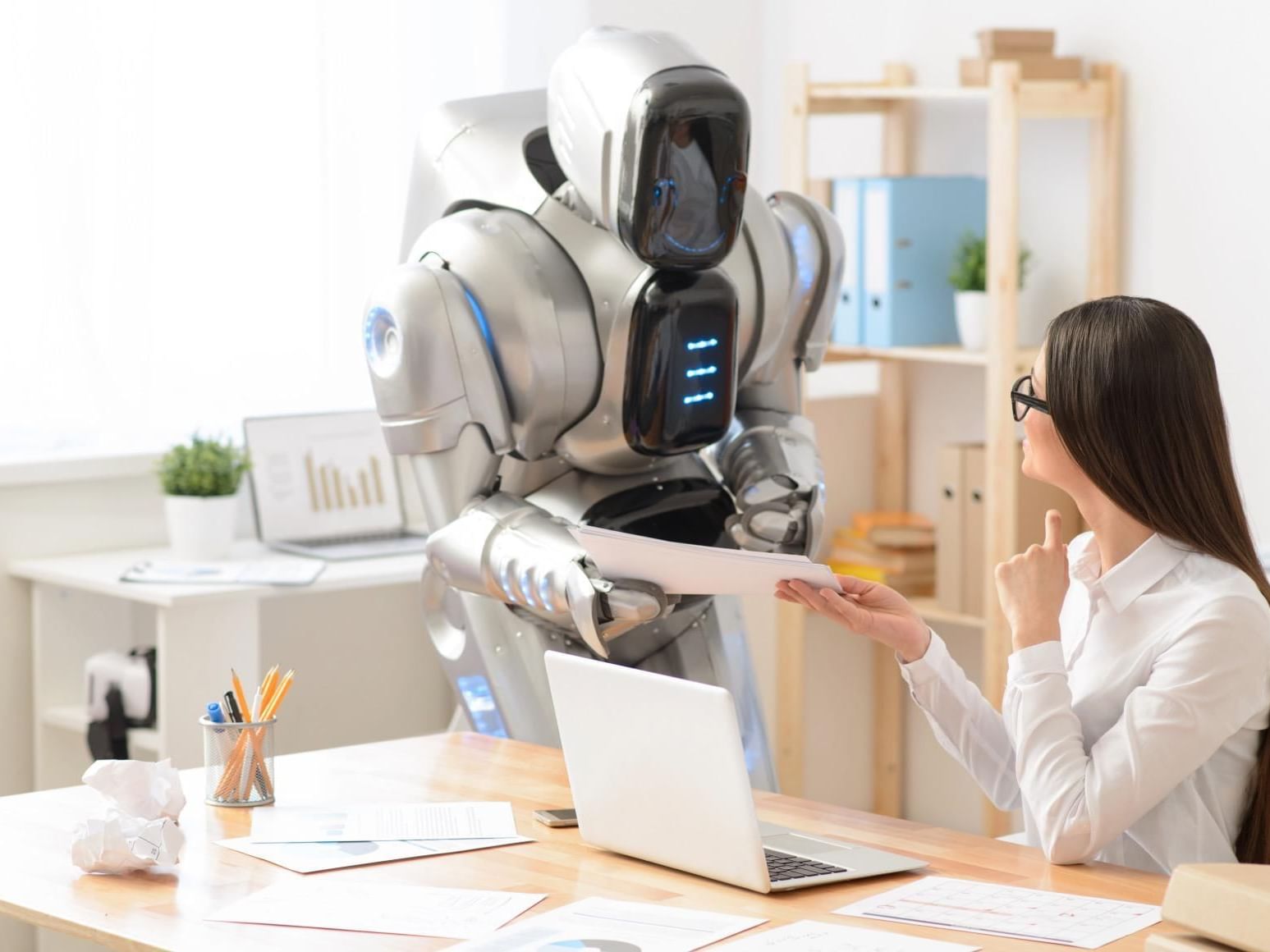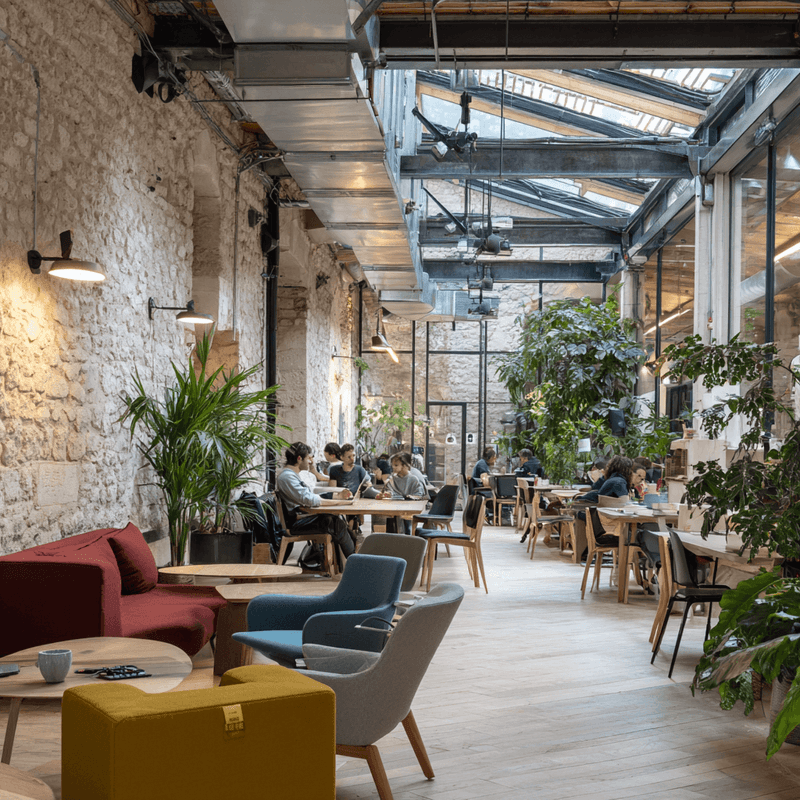
With the advent of artificial intelligence and automation, what fate awaits our beloved coworking spaces? In just a few years, they've become the darlings of employees and companies alike, and can they adapt to this new evolution in the world of work by adopting even more radical changes to their models? Will robots share our offices? Will artificial intelligences become our colleagues? Explore with us the possible futures of these iconic collaborative work spaces, and discover how AI is redefining the way we share and use our professional spaces. Join the conversation on the future of work and discover how to stay relevant in this era of technological transformation!
The world of work is heading for a new technological revolution
Since the Internet revolution of the 2000s and the ensuing digital revolution with its democratization of Internet-related tools and technologies, NICTs have had an undeniable impact on our lives and social behaviors. They have transformed society as a whole.
Digital transformation has also reshaped the look and feel of our workspaces, our tools and our internal operating methods. To such an extent that today, almost half of the French workforce and two-thirds of employees worldwide embrace flexible working outside the walls of their company, notably withincoworking spaces. Coworking is emerging as a response to the changing needs of workers, emphasizing flexibility, collaboration and exchange.
At the same time, distances are disappearing, paving the way for effective collaboration between individuals dispersed over several sites but nonetheless connected thanks to digital HQ solutions. Laptops and smartphones are the new symbols of work.
Coworking is adapting to the new demands of workers seeking flexibility and autonomy. But the trend doesn't stop there. With the advent of cutting-edge technologies such as AI and automation, we are already in a position to perceive future major transformations.
How is artificial intelligence transcending coworking spaces?
It's interesting to note howartificial intelligence and automation are already being envisaged as a means of greatly simplifying the management of coworking spaces, by taking over various administrative and logistical tasks for example.
Aspects such as room reservation, access control and predictive maintenance could be automated, offering benefits in terms of efficiency and reduced human workload. Nevertheless, this automation raises concerns about its impact on employment. Although some jobs are likely to be automated, the underlying idea is that this could also open up new professional opportunities. People will still be needed to manage spaces, but perhaps the new profiles of coworking manager or hospitality manager will be more connected in the future. Clémence, Coworking Manager at Hiptown, was already well aware of these issues in a previous interview with her by the workin.space team: " I think the future of coworking centers is going to be increasingly focused on services and support. I think my job will certainly evolve towards something ever more cross-functional, with more metrics. ".
It is essential to keep a close eye on this evolution, anticipating the adjustments needed in terms of training and skills development to adapt to the transformations in the labor market brought about by automation.
The balance between automating repetitive tasks and creating new, high-quality job opportunities remains a crucial consideration in this context.
The role of the human being in the age of AI
Despite the enthusiasm that artificial intelligence inspires in companies and employees alike, it also raises a number of concerns that will have to be addressed over time.
A survey conducted in May 2023 by the Sapio Research institute revealed that, for 44% of the employees questioned, AI is synonymous with greater professional efficiency, in particular through the gradual liberation from administrative and low value-added tasks.However, 49% fear that AI will eventually replace them in their company, and 62% think that the lack of human contact will have a negative impact on their quality of work.
Jeremy Rifkin, a leading American essayist and theorist of the " third industrial revolution ", weighs up these data and confides in us his vision of the new artificial intelligences and their potential impact on the world of work, asserting that just like the previous revolution, we are deluding ourselves: " AI is just a tool, not an alternative to humans. ".
While AI and automation are destined to transform jobs in the coworking sector, they also represent a valuable opportunity to redefine the human role. Instead of being replaced by these technologies, people could refocus on their distinctive skills, such as creating social links between users or providing personalized support. These technologies enable us to do just one thing: focus on what really matters!
As such, these technologies promise not only to improve the management and use of spaces, but also to enrich the user experience through increased personalization. However, it's crucial to ensure that this technological transition is conducted with care, so as to reap all the benefits without losing the fundamental element that truly characterizes the strength of the coworking model: its humanity.
The harmonious coexistence of AI, automation and the human in coworking spaces seems to be the key to meeting future challenges while maximizing the benefits offered by these technological advances. By continuing to foster flexibility, collaboration, and adaptability, coworking spaces can remain essential catalysts for the positive evolution of the world of work in the age of technological transformation. So, by embracing these changes with foresight, coworking has the opportunity to reinvent its role and remain a central player in the ongoing evolution of the professional landscape.
-
How can the flexible office reconcile real-estate costs and employee expectations?

05/01/2026 How can the flexible office reconcile real-estate costs and employee expectations?
For decades, the office has been seen as an immutable anchor: an assigned position, a fixed desk, a space designed to accommodate every employee from Monday to Friday, between 9am and 6pm. But this model, long considered indisputable, is now faltering under the impact of profound transformations in the world of work. Massive telecommuting, renewed employee expectations, the search for balance and meaning, and economic pressure on real estate are all forcing organizations to rethink their approach.
-
From cost reduction to cultural transformation: the real challenges of the flexible office

15/12/2025 From cost reduction to cultural transformation: the real challenges of the flexible office
Giving up personal office allocation was no longer seen as an upheaval, but rather as an obvious way of reducing costs, improving real estate efficiency and adapting spaces to contemporary uses. However, the companies that have taken the plunge recognize that the reality far exceeds this initial justification. A genuine cultural transformation was underway!
-
Does coworking restore the value of work?

08/12/2025 Does coworking restore the value of work?
Today, many organizations see Coworking as more than just a real estate service; they see it as a space capable of restoring value to work itself and re-engaging teams. But what exactly is this "value" that coworking claims to restore?